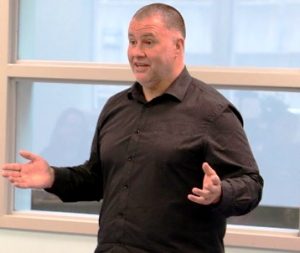As part of our commitment to supporting professional development in incorporating Indigenous knowledge and perspectives into teaching and learning at VIU, the Centre for Innovation and Excellence in Learning, together with the Office of Aboriginal Education and Engagement, recently hosted Ron Bull, senior Indigenous scholar from Otago Polytechnic in New Zealand. Ron spent the day at VIU engaging in a variety of meetings, discussions and presentations, and sharing with our community his stories and expertise. Ron was able to end his day at the Witness Blanket Installation ceremony, a moving event for the VIU community, and for Ron Bull as well.
At Otago Polytechnic, Ron is a senior lecturer, as well as Acting Kaitohutohu, a senior leadership position focusing on the formation and implementation of Otago Polytechnic’s Maori Strategic Framework. This framework document informs how Indigenous knowledge and values are integrated at various levels in the institution. In this capacity, Ron is involved in building confidence in his institution’s staff in working with Indigenous peoples, and in incorporating Indigenous knowledge into curriculum design.

I was fortunate enough to spend most of the day with Ron, listening to his stories and hearing his passion and knowledge emerge from within those narratives. He opened each of his more formal sessions by acknowledging the land where he was from, the land he was on, the directions from which he came, and the people who stand behind him. He did so in his own language and then translated his words for us. During both of these talks Ron also held on to a small, shiny stone that he explained was from his home land. As Ron put it, this stone connected him to his people and his place, and gave him strength and support to tell his stories. I noted when he spoke that more than once he referred to his home land as a “place where he could put his feet in the water.” I liked this expression.
Perhaps most interesting for me was Ron’s discussion of his institution’s Maori Strategic Framework, the priorities within that document, and the directions in which Otago Polytechnic is moving to support the implementation of this framework. Ron described for us the main priorities within the document which include:
• To have an effective partnership with Kai Tahu/Maori
• To attract, support and retain Kai Tahu/Maori staff at all levels within the institution
• To have Maori participate and succeed at all leaves of learning
• To develop quality courses to incorporate Maori knowledge into all program areas
• To have an inclusive learning environment for all learners in all programs
• To support research that is relevant to Kai Tahu/Maori communities
After outlining these priorities, Ron described related opportunities at his institution including a mandatory treaty education workshop for all faculty and staff. In this course, the historical and social implications of the Treaty of Waitangi are discussed, and participants examine within this context a broad range of issues, pedagogical and beyond. As Ron explained, this course is one way his institution is encouraging understanding and inclusivity among its faculty and staff. But Ron also pointed out how New Zealand’s journey and context differs from Canada’s, especially in regards to the reconciliation process. As Ron explained, New Zealand is further along on their journey, working past reconciliation. How that journey, and our respective points along it affect how our institutions move forward with frameworks and opportunities is something I am left to consider. But it felt hopeful, and listening to Ron describe where his institution was, and where it was going, also left with me a sense of optimism.
As the day wrapped up, and we walked back across campus to our offices, Ron looked at the ocean and asked me if I spent much time swimming in the area. I told him that as often as I could, I put my feet in the water. He smiled at that.
Thank you Ron Bull for visiting with us and sharing your stories and your spirit. You are always welcome at VIU.